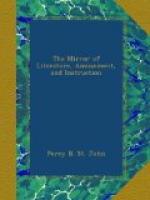I cannot completely effect my purpose of reminding the public of what they have lost in this fine singer, without recurrence to the songs in which he earned his fame. “Pleasant is the recollection of the joys that are passed,” says Ossian; and what a delightful store-house of melody is opened by the remembrance of these songs! At the head of the list, in unapproachable beauty, stand his “Black-eyed Susan,” “Storm,” “Old Towler,” and “Lads of the Village;” songs which few voices can attempt, and none dare hope to equal him in. Then, as operas, we had first his Macheath, a part in which, notwithstanding what has been said of his slovenly acting, I think him unequalled. His was the voice to burst forth in the rich melodies of that equivocal piece—he was the gentleman who, if ruined by excess, could become the highwayman—his was the dashing, manly style to ensnare either a Polly or a Lucy. Poor Macheath is now emasculated, because no man has voice to sing his songs. I have heard Mr. Young has played the part, and “report speaks goldenly” of his singing, and I deeply regret not having heard him. I understand he sings Moore’s melodies better than any body; and think it likely, from the few “snatches” I have heard him give. By the bye, excepting the hurried, thick utterance of Incledon when speaking, there is great resemblance, as far as regards voice, between that singer and Mr. Young.
As a Shakspearean, I must class next his two sweet songs in “As You Like it.” His was the pipe to be listened to amongst the warblers of “Ardenne,” in Dr. Arne’s delicious “Blow! blow! thou Winter’s wind,” and “Under the green-wood tree.” “Oh!” as Jaques says, “I can suck melancholy from the recollection of these songs as a weasel sucks eggs.” Then follow Jackson of Exeter’s “Lord of the Manor,” and Dibdin’s “Quaker” and “Waterman;” pieces after Incledon’s own heart; all free, rich, clear melody, without glitter.
But of all the composers of his own day, Shield[6] was his favourite; and justly. He furnished him with most of his popular songs. The singer was the peculiar organ of the composer—his “Thorn,” his “Mouth which a Smile,” “Tom Moody,” “Heaving the Lead,” and many, many others, seem to have faded away with the voice of the melodist.
[6] Let the lover of melody
look over the list of works
published, in the obituary
of that beautiful composer!
But I find, were I to run through, as I proposed, all the songs peculiar to my hero, I should, most likely, tire my reader. The delight with which I dwell upon them is a species of egotism; I will therefore only name a few more, and “leave him alone with his glory.”—“Sally in our Alley,” the song Addison was so fond of; what an association! “Post Captain,” “Brown Jug.” In his decline, even “His father he lost,” and “On Lethe’s banks,” in Artaxerxes;—hear the singers of the present day sing these songs! “Bay of Biscay,” “When Vulcan forged,” the second of “All’s Well,” “Bet, sweet blossom,” “Will Watch,” “Last Whistle,” &c. &c. Alas! alas! and all this over! He has piped his last whistle, and poor Charles “sleeps in peace with the dead!”




